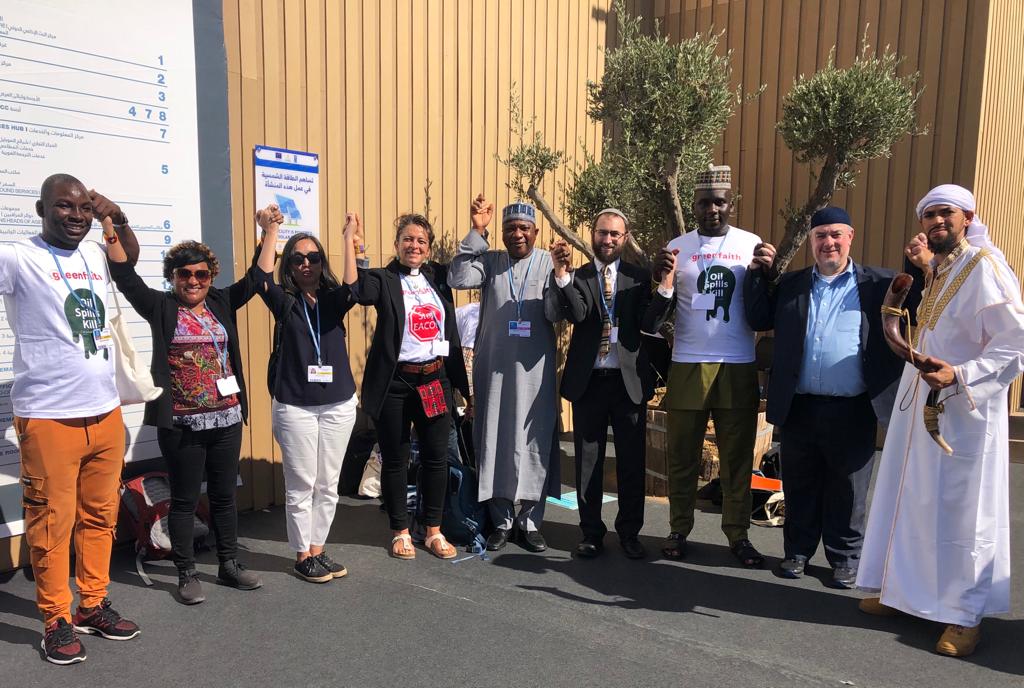
Spiritual ecological partnership smashes Tablets on Mount Sinai claiming “broken promises”
A group of religious leaders held a ceremony in the Sinai Peninsula to call on the world to pay more attention to the environment by smashing a pair of tablets on the ground earlier this week.
In an initiative called The Sinai Climate Partnership, The Interfaith Center for Sustainable Development (ICSD), The Elijah Interfaith Institute, the Peace Department, the United Nations Faith for Earth Initiative, Gigawatt Global, and the Israeli environmental advocacy organization, Adam Teva V’Din took part in the United Nations Framework Convention on Climate Change (COP27), which is taking place in the Sinai Peninsula, in Sharm El Sheikh, Egypt.
But the faith leaders took an alternative approach, seeking a faith-based solution to the ecological crisis by promoting the “Ten Principles for Climate Justice” in a global initiative. Toward this end, they held a sunrise ceremony on Sunday at the summit of Jabal Musa, a mountain in the southern Sinai Peninsula that according to some traditions is the site where Moses received the Ten Commandments.
A symbolic delegation of five members ascended and was joined by several participants from the COP conference. The group read from a new draft of their “Ten Principles for Climate Repentance,” recently composed by dozens of multifaith leaders meeting in London over the week.
The Ten Principles for Climate Repentance (mini versions) are as follows:
- We are stewards of this world
- Creation manifests divinity
- Everything in life is interconnected
- Do no harm
- Look after tomorrow
- Rise above ego for our world
- Change our inner climate
- Repent and return
- Every action matters
- Use mind, open heart
After the reading, Yosef Abramowitz, CEO of Gigawatt Global, smashed a pair of tablets on the ground.
One tablet was made by youth from the Israeli branch of Strike 4 Future, painted with the words “Broken Promises” (הבטחות שבורות/havtachot shvurot) in Hebrew.
“I was just a messenger for the young people,” Abramowitz told Israel365 News. “If you look at the state of the world, and you realize that the original ten commandments and the spiritual promises to maintain the planet are not being honored.”
The other tablet was painted green, to symbolize the “green commandments,” Abramowitz told the media.
“We look down to Sharm el-Sheikh and we’re not satisfied,” Abramowitz said as he smashed a tablet.
“The political leadership of the world has not come through on climate until now, ” he said. “It’s the 27th gathering of world leaders, and things are just getting worse. We are calling on faith leaders to add to the sense of urgency and to have them weigh in, hopefully forcefully and globally, to push for the reduction by 50 percent, at least, of global warming emissions by 2030. Reducing emissions so gradually is immoral at this point.”
Abramowitz noted that the significance of Mount Sinai was important for the ecological initiative.
“Smashing the tablets was intended to be very much in the spirit of Moses’ reaction to seeing idolatry,” he said. “What happened at Sinai 3,700 years ago changed the course of morality in civilization. Sinai is a relatively small mountain that has played an outsized role in ethics and actions worldwide.”
Abramowitz noted that the location chosen by the UN was significant to religions around the world.
“The proximity to the UN climate conference meant that Mount Sinai has a chance, once again, to hopefully influence the actions and morality of mankind,” he said. “At the time, it seemed strange to people that this location was chosen for the UN climate conference but maybe, from a spiritual perspective, it was chosen to connect with Sinai for a deep moral imperative the world has to face. The UN brought together political leaders but Sinai brought together religious leaders to save the majesty of God’s creation.”
“We’re running out of time,” Abramowitz warned.
Rabbi Yonatan Neril, the founder and Executive Director of The Interfaith Center, explained that ecology is in its essence a religious imperative.
“This isn’t just about ecology,” Rabbi Neril told Israel365 News. “We used religious symbols and terms because we want to address the deep issue of how religious people relate to materialism. If we are going to live ecologically sustainable lives, we need to change parts of our current lifestyle. We will need to be less materialistic and more spiritual. This is a religious ecological agenda.”
“People who don’t want to give up their materialism will naturally oppose these teachings,” he said. Toward this end, Rabbi Neril authored the “Eco Bible An Ecological Commentary” which describes ecology as “achieving a more sustainable future in accordance with God’s Will.”
At the same time as the event at Jabal Musa, dozens of religious leaders, Jews, Muslims, Christians, Hindus and Buddhists from Egypt, the USA, Israel, India, Spain and Great Britain gathered at the base of Parliament Hill in London and other places around the world in a call to the world to act for climate repentance and to act according to the ten universal principles on climate.
The post Spiritual ecological partnership smashes Tablets on Mount Sinai claiming “broken promises” appeared first on Israel365 News.
Israel in the News